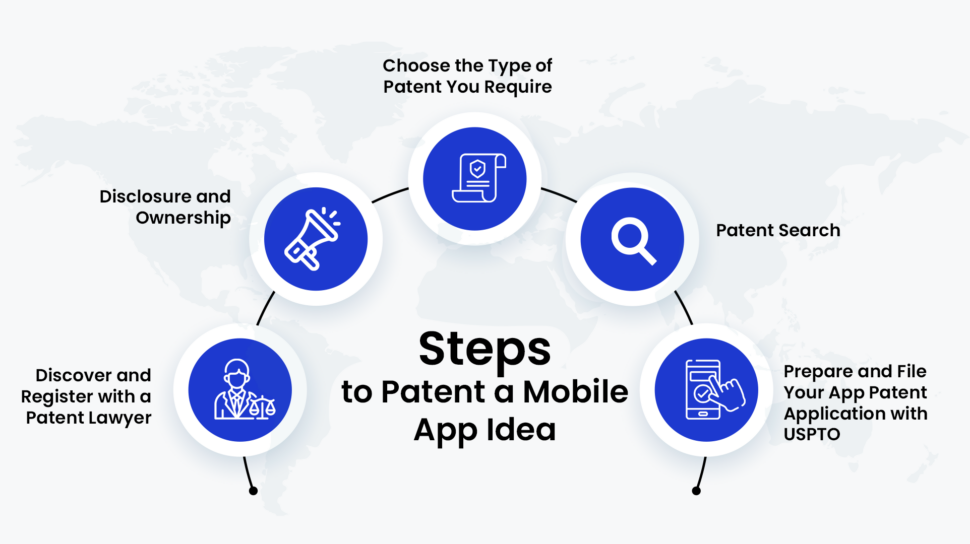With countless mobile applications out there, out-of-box ideas still need to be built in the world. But what happens when someone else has your idea or makes a mobile app with similar features before you plan the launch? – Well, you lose credibility, and your chances of success are lowered.
This is where a patent comes into the picture. While registering for patents does take a lot of work, they become a necessity if you wish to protect your app from marketplace copycats. For such situations, every business must patent, copyright, or trademark their mobile app idea to protect others from stealing their unique app idea, as they take the time to differentiate their apps from an average app from a high-revenue app.
If you are keen on patenting an app idea, there may be many questions, like how to patent a mobile idea, how much it costs, how to go about it, and what if it is already patented. These are some crucial answers we will be answering in this blog about app patents as we will walk you through the specifics of what it takes to patent an app idea.
What Does Patenting a Mobile App Idea Mean?
A patent is a type of intellectual property right that protects your app idea from unauthorized or illegal use. It prevents other people or businesses from selling or changing it, as you are the sole proprietor of the app idea. After you ensure the novelty and uniqueness of the idea, you can proceed with the patenting process.
It is, however, crucial to note that you cannot patent your app’s code as it falls under a category of law covered by copyrights. But you can patent the methods and processes, machines, articles of manufacture, title, icon, logo, and other parts of the app’s design.
Why Patenting an App Idea is Important
The most crucial reason to patent an app idea is that it gives you legal protection against anyone who violates intellectual property rights. If the other app or party does anything connected to the software patent without proper authorization, you can sue them for patent infringement.
Also, a patent for your app offers you legal protection for a time usually set at 20 years. A long protection period can ensure you take risks with your app, such as getting into licensing agreements and using your creation exclusively to maintain a competitive advantage.
In 1994, as reported, there was a significant conflict between Apple and Microsoft on copyright infringement law. Apple sought to prevent Microsoft from using a visual GUI similar to Apple’s Lisa and Mac OS. However, Apple lost the case since it had not gotten patent-like protection. Things would have turned out to be different had Apple patented the concept.
When Should You Apply for a Patent
Many arguments exist about whether patenting is worthwhile, as they do not necessarily contribute to the app’s success. Thus knowing when it makes sense to apply for a patent is critical. Consider the following if you are applying for a patent.
- Goal: You need to determine why you are filing for a patent and whether you want to protect app ideas from theft. Are you planning to make a profit on your app?
- App Impact: Smartphone apps come with short lifespans usually as most viability is three years. How is your app going to impact users? See if it has the potential to last more than three years, and only then opt for a patent.
- Value: Not all apps are commercially viable. If your app falls into a niche category and feels less likely to be profitable, you will probably not need a patent.
- Competition: With plenty of apps out there, only a few are likely to be noticed and gain a market share. So is your app strong enough to compete is what you need to determine before filing a patent.
- In addition to the above, a patent is unnecessary if you already have a copyright or trademark. Also, you must consider how long it takes to patent an app, as it can delay long-term business plans.
An important point to note here is that a patent won’t prevent other companies from taking legal action against you for infringing on their patent if found similar. Therefore, an extensive and thorough patent search is important before filing one. In case the patent study discloses anyone has patented a similar idea as yours, you need not lose hope. Research your idea better, see how you can make your app different, and innovate it to make it better and new.
How to Know Your App Eligible for Patent
Apps can be patented, but it does not necessarily mean your app is eligible for a patent. The following are some critical points or criteria to consider for the eligibility of the mobile app for a patent.
- Novel and Solve User Problem: Before filing a patent application, a patent search test must be conducted at the specific patent office in the concerned country. It checks if any existing patent exists or if it violates any other one. Your mobile app must differ from all preceding inventions, which is the basic factor for differentiation.
- Useful and unique: The app idea must be useful, which means developing the app for entertainment purposes is unacceptable. The app must also work in theory, and your idea must not be under the clone category when filing the idea for patenting.
- Non-Obvious: The idea must be non-obvious, and this is one of the toughest aspects to fulfill as per the laws and rights. To qualify as non-obvious, somebody skilled in the field must view it as an unexpected development and categorize it into a patent. This can be subjective and a major source of frustration between you and the examiner.
Remember the above for your app to be unique and subject to patent law.
How To Patent A Mobile App Idea – Steps To Follow
The following are the basic steps to patent an app idea. When you hire an app development company, they can quickly assist you in the entire process.

Discover and Register with a Patent Lawyer
It is necessary to hire a patent attorney for getting a high-end patent and increase your chances of getting the app idea selected. They have experience in the patenting software field and in several legal actions that may be needed during the patenting process.
You can opt for a professional attorney or an experienced and reputed law firm with attorneys specializing in software patenting.
Also Read – Fail-proof Mobile App Launching Strategy
Disclosure and Ownership
Your app must pass a few aspects, such as feasibility, eligibility criteria, and realism, to get approval for your patent from the court. Documenting the entire process and providing proof of invention and patent ownership to the court is essential.
Additionally, patenting the mobile app idea functionality is important too, when it comes to patenting. For this, you can create a flowchart to help the patent attorney understand your app idea’s features, procedures, and functionality in detail. Further, you can also prototype the mobile app to test the flow.
Choose the Type of Patent You Require
Based on the market size, and novelty of the app idea, there are two major types of patent apps, i.e., non-provisional and provisional. Let us understand the two in detail.
Provisional Patent Application
A provisional patent for an app is one of the common types suggested when beginning the app patenting process. It has no formal obligations such as data declaration, the formal application process, etc., making it easy to get started. Here are some of its benefits.
- It grants 12 months to develop, refine and modify the idea to create the MVP
- As compared to non-provisional, the costs are lesser for this application type.
- It allows a “Patent pending” on the app that gives you time to know if your app can be successful.
Non-Provisional Patent Application
An applicant must submit a non-provisional application within 12 months of filing the provisional one to secure the patent rights for the inventions. A detailed description, including the idea legality, claim, specifications, etc., is a must for filing the patent type. Some of the benefits it offers are –
- Long-term, and wide-range of protection for your app idea
- Allows you to file a lawsuit against the infringer,
- Gives exclusive rights to profit from the idea,
- Has enforceable claims to protect intellectual property
Patent Search
You have done enough research for the app idea and decided on the type of process. It is now time to do in-depth patent research with the patent attorney and developer you hire. At this stage, focus on finding any upcoming issues to be resolved to get fast approval in the patent field. While your developer works on this, your partnered attorney can do a global-level search for apps similar to yours. This way, your app patent can be made secure and the chances of getting approval can be ensured.
Prepare and File Your App Patent Application with USPTO
After doing the aforementioned steps successfully, patenting the mobile app idea is essential, which is the final step before filing it with the USPTO. The following is the list of documents needed to complete the submission process.
- Declaration or Oath
- Information Disclosure Statement
- Application Data Sheet
- Specification
- Drawings
- Claims
- Patent Cooperation Treaty (Optional and for International Filings)
- Cover Sheet
- Fee Sheet
- Entity Status From
- Application to Make Special(optional)
Ensure to provide all the information listed above and apply with the relevant agencies.
How Much Does it Cost to Patent a Mobile App Idea
Patenting takes time. It can be a complex, expensive process, but there are ways to manage the app patent cost.
You can start with a provisional patent application; that is the first option you can go for as it secures the filing date and allows you to explore the market. It is like a placeholder that secures you a patent and may cost between $3000 to $6000. The filing fees may vary from $70 to $140, depending on the client type. The $3000 is usually for the MVP, and once you file a provisional application, it is valid for one year during which you can build, test, and launch the app.
The $6000 application is for a fully developed app which you can later upgrade to a non-provisional patent. If you wish to file both, the provisional cost is credited against the costs incurred for a non-provisional.
Recommended – App Development Contract, Legal Requirements
A non-provisional patent is much more complex and expensive and may cost between $13,000 to $18,000 to prepare, get a claim set, fetch the drawing, etc. The filing fees vary between $450 to $800 depending on the client type. As told above, the provisional cost is credited against the costs incurred for a non-provisional.
Once the non-provisional patent application is made, the patent examination begins, and it may take a year to three to get through this stage. The patent application will undergo vigorous vetting and may cost $5000 to $15,000. Since your mobile app is in the market, you can know if your app is valuable enough to continue pursuing patent protection.
Once your patent is approved, you must pay an issue fee of $1500, including legal fees and USPTO. The remaining patent fee at the end of the 4th year($800), 8th year ($1800), and 12th year ($3700) must be paid to keep the patent.
Therefore the fees to patent a typical mobile app cost anywhere from $20,000 to $3,000, along with maintenance fees over the following 12 years.
If you choose to hire an attorney to handle the patent application, the following are the costs involved.
| Type of application | Cost |
| Prepares a provisional patent application | $2,500 to $5000 |
| Prepare a non-provisional patent application | $10,000 to $15,000 |
| Re-applying if the original application is rejected | $5000 to $15,000 |
How Ailoitte Can Help Patent Your Mobile App Idea
Now that you know in detail regarding how to patent an app idea, if you believe in your app idea and believe it has the competence to become an invention, contact an app development company like Ailoitte. We can help you in the mobile app development process and help save your idea from app cloning and safeguard your app idea.
Save your idea and protect it as intellectual property by partnering with us, as we can help you enter the market with a scalable, responsive, and user-friendly app for growth and profit. Contact us today for a consultation.
FAQ
It is essential to file a patent application before disclosing the details of the invention. If disclosing the invention is unavoidable-then the disclosure must be accompanied by confidentiality or a non-disclosure agreement before filing a patent application.
Anyone can copy and launch your app idea before you build it. Therefore having a clear and well-considered strategy can help defend your app idea and prevent it from cloning.
The three ways to legally protect your idea other than patents are trademarks, copyrights, and NDA (Non-Disclosure Agreements).
The patents last 20 years from the date the patent application is filed. Utility patents have a 20-year term and design patents have a 15-year term. After the end of this period, you cannot renew a patent for an additional term as it becomes a part of the public domain.




















.png)
.png)
.png)



Leave a Comment